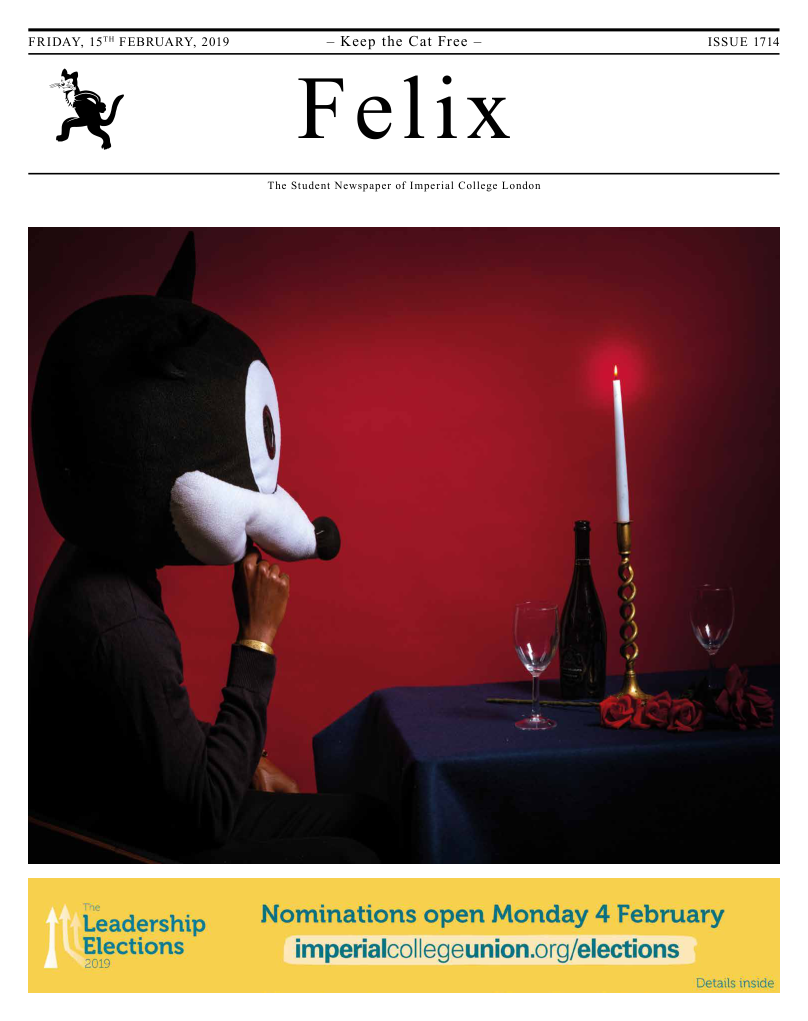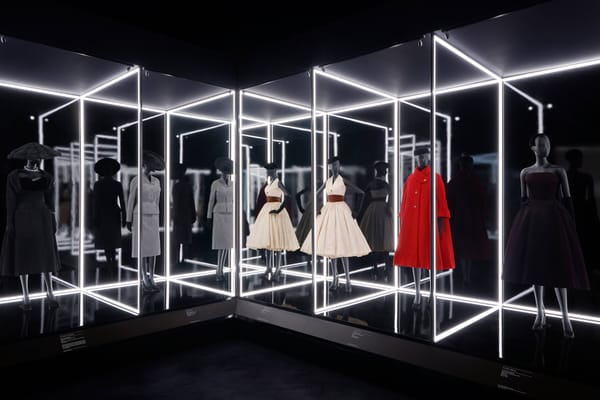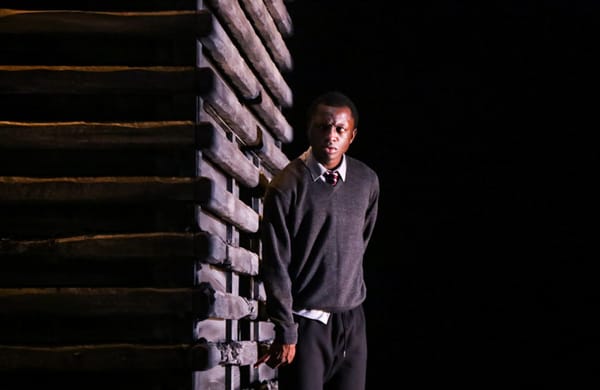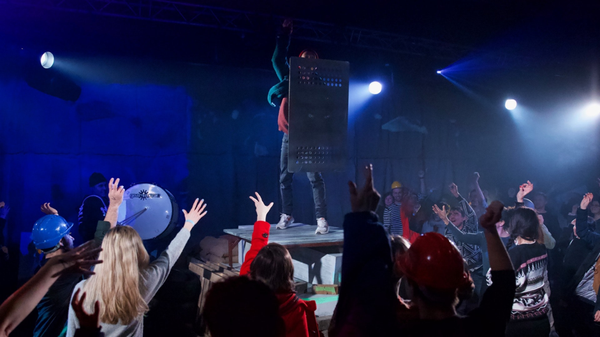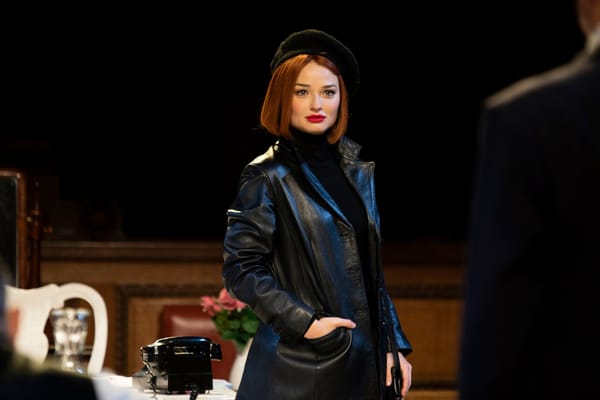Surreal and beautiful: The Good Person of Szechwan
Brecht’s political commentary, boldly executed

How can a good person survive in a world which is intrinsically evil? This is the question Bertolt Brecht poses to us in his play The Good Person of Szechwan. Set in Sichuan, it tells the story of how the gods reward a poor prostitute Shen Te, ‘the only good person in the city’, with enough money to buy a small tobacco shop. Unfortunately, Shen Te’s kindness is immediately exploited by all and sundry, so that she is forced to invent an alter ego – her straight-talking, merciless cousin Shui Ta – to restore order and rescue the business. Despite her reluctance to bring out Shui Ta, ‘he’ has to stay for ever-increasing periods of time, eventually subsuming the virtuous Shen Te. There is, after all, no place for the good in a world such as ours.
For those unfamiliar with Brecht, the German playwright was best known for his ‘epic theatre’, highly political theatre that aimed to get the viewer to think critically about contemporary issues. He popularised the Verfremdungseffekt (‘estrangement effect’): by constantly breaking the fourth wall, audiences were prevented from immersing themselves in the events of the play, forcing them to think critically about what was being presented on stage. Brecht went so far with the ‘V-effect’ as to read stage directions out loud, hold up placards to indicate subtext, and rearrange the set and lighting in full view of the audience. While highly influential in concept, his plays are rarely performed in full nowadays for obvious reasons – people aren’t very fond of going to theatres to be lectured.
Yury Butusov’s exuberant rendition of The Good Person of Szechwan breathes fresh life into Brecht’s parable-play. Ambitious in scope and buzzing with energy, his direction has the talented actors of the Moscow Pushkin Drama Theatre singing, dancing, and even riding bicycles across stage. The acting is at times hilarious, at times touching, but always fierce. Butusov achieves the V-effect not by stripping the play of its entertainment value, but rather by kicking it up to eleven and sprinkling on a touch of the surreal. A three-hour long play in German and Russian really shouldn’t be this enjoyable. Part vaudeville act, part oratorical play, Butusov manages to make Brechtian theatre both entertaining and highly accessible.

In true Brechtian fashion, the set designed by Alexander Shiskin contributes to the sense of disconnect between audience and actors. Elements of the set are scattered loosely about the stage and picked up as necessary to play their part in different scenes. A single door stands in for an entire house; microphones stand ready for the cast to grab when they burst into song. Gigantic images, thematically related to what’s happening on stage, are projected darkly on the back screen. A nod to Brechtian placard-holding, but so subtle that you don’t notice till you look up and it’s suddenly there.
This being a theatre company from Moscow, the play itself is in Russian, but the original German songs by Paul Dessau are kept. The German pronunciation occasionally leaves something to be desired, but thank goodness for English subtitles! Musical director Igor Gorsky has a lot on his plate: not just Dessau’s German songs, but an entire soundtrack of jazz numbers, revues and rock music which all enliven the play. Miss Mi Tzu (Irina Petrova), Shen Te’s upper-class landlady, has a hilarious theme song that plays whenever she minces across the stage, while the leather-clad policeman (Aleksey Rakhmanov) belts out his lines like a rock star from the ‘70s. Lively jazz sets the scene for wild cavorting by the local ne’er-do-wells, who all want a piece of Shen Te’s newfound wealth; meanwhile, Ryuichi Sakamoto’s aching ‘Merry Christmas Mr Lawrence’ is played when Shen Te falls in love with her pilot (who sadly, like the rest, only wants to exploit her). This is all manfully carried out by a four-person live band who are a constant presence on stage throughout the play, and should really be credited in the programme.
The staging is lavish, awash with beautiful, surreal images. Wong, the water-seller (Alexander Matrosov), frequently and symbolically makes use of dry sand. Rice rains from the sky as a god rides a bicycle through a forest of gaunt trees. Shen Te (Alexandra Ursulyak) converses with her alter ego Shui Ta who, improbably, is walking calmly on a treadmill in the middle of a forest. In one of the most dramatic scenes, empty cigarette packets rain down like gold, while Shen Te, alone on stage but for a full-length mirror, confronts her own reflected image.
Duality is a major theme of the play, and Ursulyak plays both sides of her character with aplomb. It is easy to see the conflict between her good-hearted nature and her inability to survive while being true to herself; the harsh reality of Brecht’s world inexorably crushes the goodness out of her. Matrosov as the destitute water-seller alternates between a pitiful cripple and a sort of messenger to the gods. The three gods here are ingeniously replaced by a single actress (Anastasia Lebedeva) who appears thrice in different incarnations, all equally enigmatic.
Butusov’s compelling production makes us laugh, but also forces us to think. When Brecht wrote his play in 1941, war was breaking out around the world. Just months after the first performance of The Good Person of Szechwan, the United States would formally declare war on Japan in response to the attack on Pearl Harbour. Events today are not quite as bleak, but it is a question worth considering in any era. Is our world so cruel that there is no place for a good person in it? Either they must go mad, as with Prince Myshkin in Dostoevsky’s The Idiot, or they must turn evil themselves, as with Shen Te.
When called upon, the gods prove to be useless, and Brecht turns to the audience to demand an answer for our paradoxical world. Butusov condenses Brecht’s final call to action into a single, powerful word from Shen Te: ‘help!’
While the Moscow Pushkin Drama Theatre has sadly left London, they will be back again in June, this time to perform Francis Beaumont’s 17th century parody ‘The Knight of the Burning Pestle’. As this brief visit has demonstrated, their irrepressible verve and energy are sure to make it relevant for modern times.
-4.5 stars

